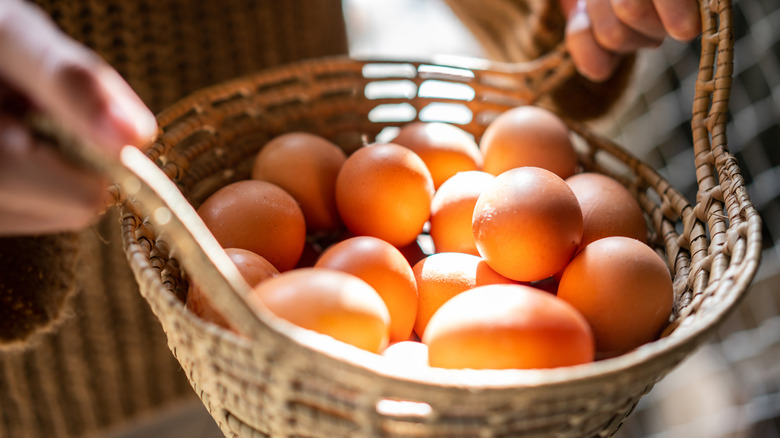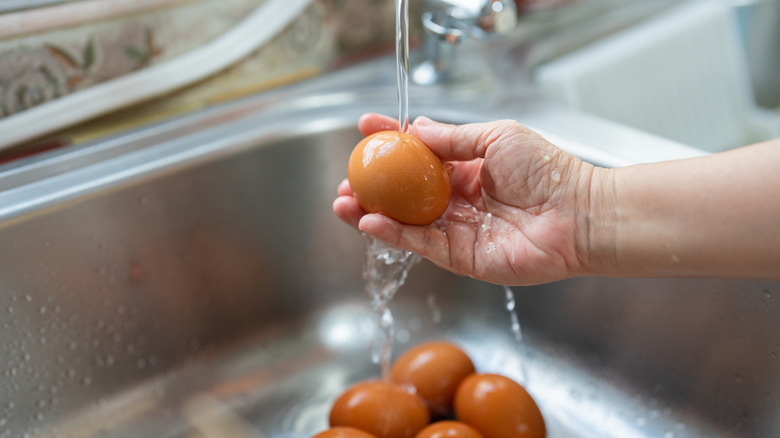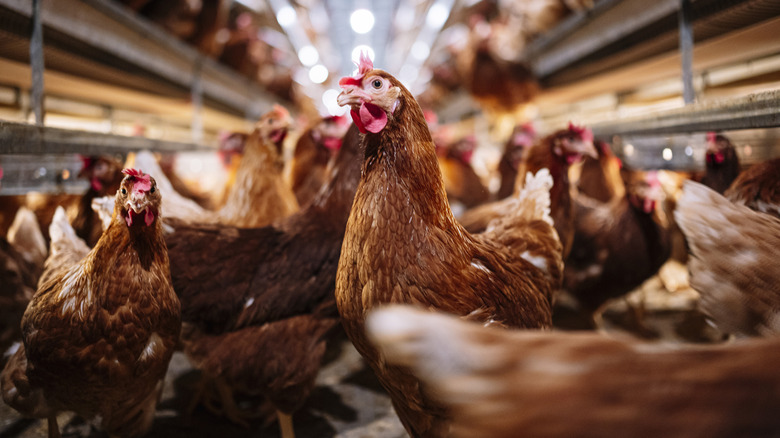Farm-Fresh Eggs Are Safe To Eat, But You Need To Know A Couple Things First
Backyard chickens won't save you from high egg prices, but farm-fresh eggs are often higher quality and have a better taste than store-bought eggs. If you've ever bought fresh eggs at a roadside stand or a farmers market, doubts might have entered your mind about whether they're safe to eat as-is. When we buy our food from grocery stores, there's an expectancy that it has already been properly cleaned and made ready for consumption, but this isn't a guarantee elsewhere. Despite this, farm-fresh eggs can be completely safe, although there are a couple of factors you should be aware of.
For starters, farm-fresh eggs do not go through the same cleaning and inspection process as store-bought ones, so it's up to you to figure out how they were handled. For example, you won't know whether they were washed or not, kept in the fridge, or stored at room temperature. These may seem like little details, but they're actually very important when it comes to food safety.
So, word to the wise, before purchasing farm-fresh eggs, you should ask about the farms' handling and storage conditions. It's not about being paranoid — it's just smart. Farm-fresh eggs can be amazing, and it's a great way to help small farms, especially during periods of inflation, but they come with more room for error than grabbing a carton from the store.
It's important to know whether your eggs have been washed
According to the USDA, store-bought eggs are washed, sanitized, and immediately refrigerated to kill off any possible salmonella. But with eggs from a local farm or your neighbor's backyard hens, the process isn't always tightly regulated. Some folks don't wash them at all, others rinse them under water, and a few might scrub them, which isn't always a great idea. Eggshells are covered with a natural "bloom" — a layer that protects the egg and prevents bacteria from getting in. If a farmer doesn't wash the eggs, that bloom stays on and the eggs can be stored at room temperature for a while. But, once they're washed, that protective layer is gone, and the eggs need to go in the fridge immediately to prevent bacterial growth.
If you're getting unwashed eggs with the bloom still intact, they're fine sitting out at room temperature for several weeks, but even still, it's safer to put them in the fridge if you know you're not going to eat them immediately. The moment you wash them, though, it's non-negotiable: get them cold. The fridge keeps bacteria from multiplying and helps your eggs last longer. A lot of people don't realize that temperature changes matter too — taking eggs in and out of the fridge repeatedly can cause condensation, which also makes it easier for bacteria to sneak in.
Know your source and trust your gut
The best way to make sure farm-fresh eggs are safe is to know who you're buying from. Whether it's from a local farmer or just a neighbor, don't be afraid to ask questions. Are the hens kept in clean conditions? When were these eggs collected? If someone's raising chickens responsibly, they'll probably be happy to explain how they do things. If they seem unsure or say something sketchy — like they leave eggs on the counter for days after washing them — it might be worth looking elsewhere.
And, once those eggs are home, use common sense before eating. You should still check to see if eggs that have been in the fridge are good to eat. Crack them into a separate bowl before cooking, especially if you're baking, so you can check for anything that seems off. If you detect a weird smell or see shells that look cracked or slimy, you should toss them. Even with store-bought eggs, stuff can go wrong, but with farm eggs, it's on you to stay on top of things for your own safety.


